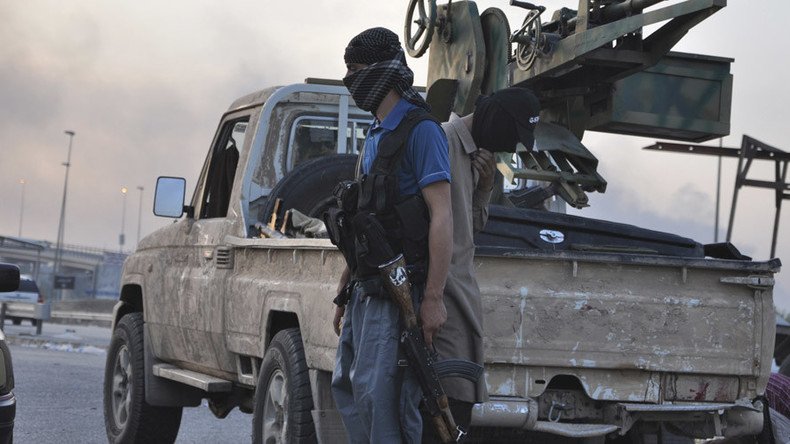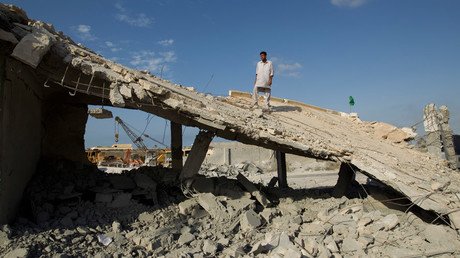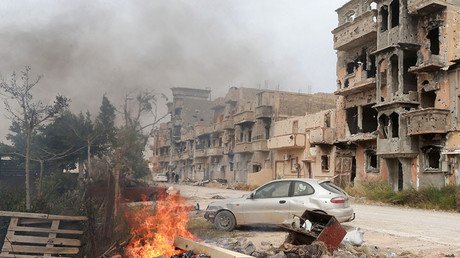ISIS plans for mini-Caliphate gains momentum

According to ISIS, the Caliphate needs to spread from Iraq all the way to the Atlantic. The terror network that emerged in Iraq in the aftermath of the US-led invasion of 2003, is moving West after establishing a firm base in Libya.
The organization that relies on US support to clear Arab ground before it settles has opted for Tunisia as its next outpost.
In early March, ISIS operatives carried out a daring attack on a small town in the south of Tunisia, close to the Libyan border.
Most of the assailants were eventually killed or captured, but the attack left Tunisia severely scarred. After suffering several attacks in the last twelve months, this latest foray well inside Tunisian territory clearly indicates ISIS is looking to settle in the small North African nation.
The Tunisian army, which in the past couple of years has been working in close collaboration with the Algerian military in a bid to stop both ISIS and Al Qaeda in the Maghreb from crossing their respective borders, failed this time to stop what numerous sources had been predicting for weeks.
ISIS terrorists entered Tunisia and attempted the take-over of the town of Ben Guedrane. The town itself is small and insignificant, but its capture would have signaled the permanent presence of ISIS inside a new nation.
The goal, as it turned out, was to establish a small Caliphate inside Tunisia.
Despite having an overtly anti-radical government Tunisia is the country that surprisingly has provided ISIS with its highest number of recruits.
The deepening economic crisis in which Tunisia was thrown into after the ouster of Ben Ali and the consequent Arab Spring meant that young unemployed Tunisians were increasingly attracted to the concept of 'jihad' that would guarantee them a regular income and potential for progression in the ranks of an organization with grand ambitions.
The disenfranchised youth of Tunisia were providing the ideal fertile ground for ISIS to not only inflate its numbers but act as the 'respectable' face of ISIS. As perfect Arab speakers, Tunisians can therefore claim to understand Arabic and the sacred texts used by the organization to justify its actions. Those recruits coming from Europe or Asia and who do not understand Arabic are therefore entirely reliant upon native speakers to translate or narrate the texts they will need to establish the much dreamed about Caliphate.
Interestingly, while the Tunisian recruits are neither scholars or even remotely versed in theological studies, their limited knowledge is what makes them prized recruits, teaching non- Arab speaking arrivals whatever is needed to be learned irrespective of its authenticity or not: packaging the teachings in Arabic is what makes the discourse appear authentic. The European recruits rely on Arab speakers to translate supposedly sacred texts their 'teachers' never actually read themselves.
In this opaque scene of selective learning, recruiters are able to manipulate the new arrivals as they wish, but the help of native Arab speakers is essential in making the deceit believable.
That some Tunisian recruits were in fact involved in a life of petty crime prior to their arrival in Syria or Iraq is neither a deterrent for ISIS' leadership or a barrier for progress. In fact, their murky pasts are often a boon to the organization as they become favorable to carrying out the worst crimes in a bid to prove their loyalty to their new - generous - employers.
Exploiting oil resources from Southern Iraq, as well as generating money from human trafficking, ISIS is a fabulously wealthy organization that can afford to reward its diligent recruits handsomely.
For those escaping what has now become abject poverty in Tunisia, the offer is attractive in particular as job opportunities in once prosperous Libya have dried up since the country was destroyed by a NATO-led war in 2011.
The fall of Ben Guedrane would have signaled a major victory for ISIS in particular as it is having to retreat from some areas of Syria, and is looking to develop its presence in Libya and further southwest into the African continent.
Meanwhile, Britain and the US are deploying troops with the official aim of destroying ISIS, implanted in Libya thanks to their military operation five years ago.
A return to peace in Libya is certainly not in Britain or the US' interest in light of the huge funds frozen by these governments when it was decided Gaddafi had to be removed.
British 'advisers' deployed to Libya to build anti-Isil cells https://t.co/e6q7BWyrhu
— Telegraph News (@TelegraphNews) February 27, 2016
Through the Libyan Investment Authority (LIA), Gaddafi - thanks to the oil price hike of 2007-2010 - pumped billions into scores of projects. From stakes in major companies, to prime real estate in London, Paris or Rome, the funds currently frozen and unaccounted for run into several billions.
Pearson, one time owner of the Financial Times, even sold a 3 percent stake to the LIA.
Should ISIS target Tunisia in such a spectacular way, both the US and Britain will have no trouble in selling further military interventions in North Africa, even if it was those initial interventions in Iraq and later in Libya, which paved the way for ISIS' criminal enterprise.
During a meeting with British Premier David Cameron, Egyptian President Abdel Fatah Al Sisi warned against Western intervention in Libya.
Despite his apparent willingness to work with Western capitals, even Sisi recognises that US troops on Arab ground usually make bad situations far worse.
In an uncharacteristically candid remark to Cameron, Sisi explained why adding fuel to a raging fire was never a good idea, especially when the flames risk engulfing the rest of the region while both London and Washington will remain sheltered from its consequences.
At a time when the British government is approving major cuts to its welfare system, public opinion is wary of more costly foreign operations. However, the spectre of having an ISIS 'Caliphate' - however insignificant - so close to European shores would give Cameron the much-needed boost he needs in parliament should he put the motion to go into Libya to a vote.
In the US, Obama is in the last leg of his second and therefore final term in office. He is already more focused on his legacy than any short term plans for war. Thus, in order to get support for further intervention the casus belli would have to be substantial.
As Libya continues to sink ever deeper into lawlessness, Tunisia appears to be ISIS' next short term plan. Having considerably affected its vital tourism sector in the last year alone, forcing scores of young Tunisians into unemployment, the network will have to strike again and in a formidable way in order to indicate the Maghreb is its next treasured outpost.
Meanwhile, as war loving leaders and their lucrative partners in the military industrial complex continue to look for ways to justify further Arab interventions, no doubt ISIS - which has so far worked almost in tandem with those leaders - will provide the much needed impetus for US troops on African ground.
In that respect, ISIS has never failed to disappoint.
The statements, views and opinions expressed in this column are solely those of the author and do not necessarily represent those of RT.















